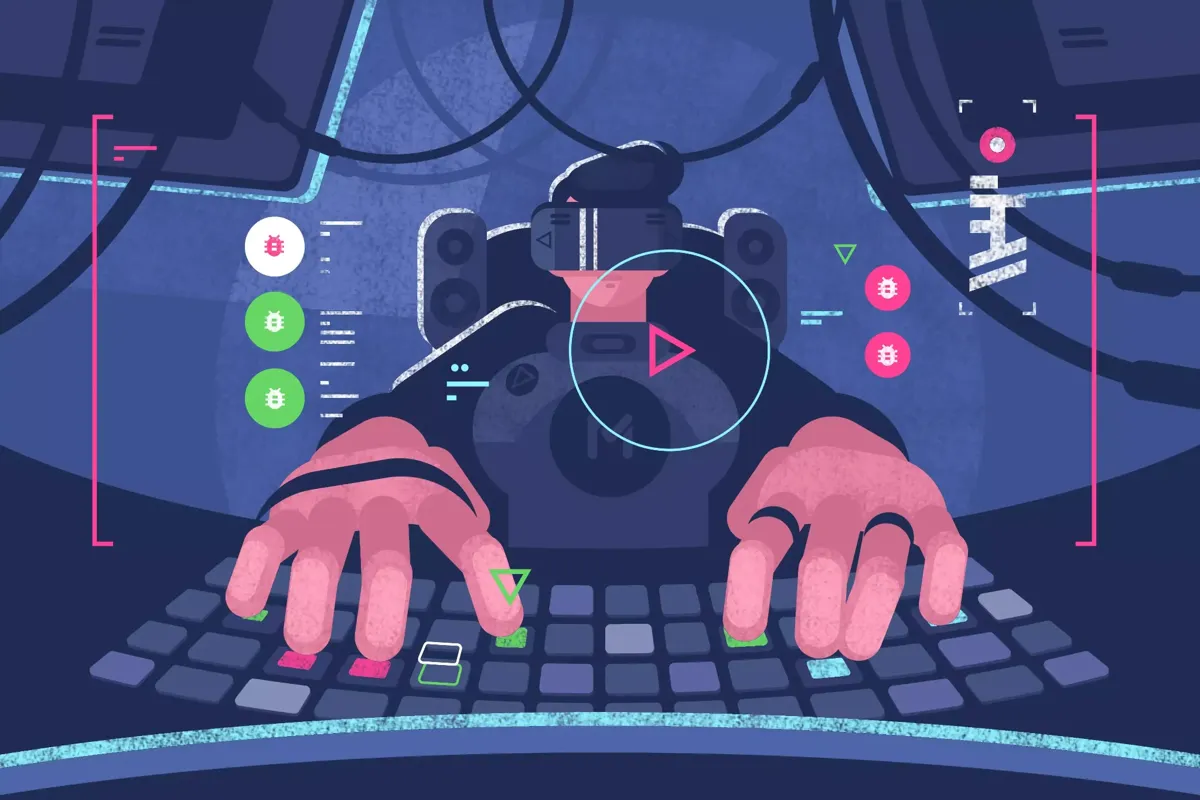The relentless demand for faster, higher-quality software delivery has propelled AI in test automation to the forefront of software engineering innovation. Far beyond augmenting existing processes, AI-powered tools are fundamentally transforming quality assurance (QA) workflows—enabling intelligent test script generation, predictive bug detection, and seamless integration into DevOps pipelines. For technology leaders and engineers, mastering this AI-driven QA landscape is no longer optional—it’s essential to stay competitive.
Organizations adopting machine learning testing and smart QA tools report significant gains in test coverage, defect detection, and accelerated release cycles. This article explores the latest trends, tools, and strategies in AI-powered test automation, offering actionable insights for CTOs, architects, and QA practitioners.
The Evolution of Test Automation
Software testing traditionally relied on manual effort, often isolated from development cycles. The early 2000s introduced automated QA tools that improved efficiency but struggled with scalability, maintenance overhead, and adapting to complex applications. Today, the emergence of AI and machine learning marks a new era. Modern tools not only execute scripted tests but autonomously generate, optimize, and maintain test cases—adapting dynamically to application changes in real time.
This accelerates adoption of continuous testing and predictive analytics, embedding quality assurance throughout the software lifecycle.
Latest Features, Tools, and Trends
AI-Driven Test Generation and Optimization
- Generative AI for Test Cases: Approximately 25% of QA teams now use AI to automatically generate test cases, significantly reducing manual effort and expanding coverage. Generative models analyze requirements, user stories, and production data to build comprehensive test suites.
- Test Case Optimization: AI tools assess existing test suites to remove redundancies, prioritize high-risk areas, and identify coverage gaps—resulting in more efficient testing cycles.
- Predictive Bug Detection: Machine learning models forecast defect-prone areas, enabling focused testing and earlier defect resolution.
Integration with DevOps and Continuous Testing
- QAOps: Testing is increasingly integrated into DevOps workflows, supporting continuous quality assurance across development pipelines.
- Shift-Left Testing: Moving testing earlier into the software development lifecycle—often starting at design—helps catch defects before they escalate, saving time and cost.
- Scriptless Automation: No-code and low-code AI tools democratize test automation, enabling broader stakeholder participation beyond traditional QA engineers.
Emerging Testing Paradigms
- Microservices and API Testing: As architectures grow distributed, AI ensures reliability and integration across complex service meshes.
- Headless and Visual Testing: AI-powered visual validation detects UI regressions missed by traditional scripts, while headless testing accelerates execution speed.
- Specialized Testing: AI expands capabilities into advanced scenarios like biometric authentication, geolocation verification, and camera image injection—critical for mobile and IoT applications.
Leading AI Test Automation Tools
| Tool | Key Features | Best For |
|---|---|---|
| Mabl | Agentic AI, natural language test creation, autonomous root cause analysis | Teams seeking autonomous, adaptive testing |
| Testim | Self-healing tests, ML-based maintenance | Scalable web application testing |
| Applitools | Visual AI, cross-browser/device validation | UI/UX quality assurance |
Organizations adopting these tools report dramatic savings—reducing testing timelines from weeks to hours and achieving significant cost efficiencies.
Advanced Tactics for Success
Building an AI-Powered QA Strategy
- Focus on High-Impact Areas: Prioritize automation of regression testing, which 45% of teams identify as delivering the highest ROI due to its repetitive nature.
- Leverage Synthetic Test Data: AI-generated synthetic data enhances coverage and uncovers edge cases that real data may miss.
- Implement Continuous Testing: Embed automated tests into every commit and build, ensuring rapid feedback and reducing technical debt.
- Adopt Model-Based Testing: Use predictive models to detect potential failure points early, informed by code changes and historical trends.
Overcoming Common Challenges
- Avoid Tool Sprawl: Consolidate testing workflows with unified platforms that handle test creation, execution, and analytics seamlessly.
- Address Skill Gaps: Invest in upskilling teams on AI and machine learning concepts, beyond basic tool usage.
- Reduce Maintenance Overhead: Select AI tools with self-healing and adaptive capabilities to minimize manual script updates.
Ethical and Governance Considerations
As AI integrates deeper into QA, organizations must ensure data privacy, algorithm transparency, and compliance with ethical standards—guarding against bias and ensuring trustworthy automated testing outcomes.
The Role of Education in AI-Powered QA
The rapid evolution of AI in test automation demands software engineers fluent in both traditional QA and emerging AI techniques. Amquest Education’s Software Engineering, Generative AI, and Agentic AI Course addresses this critical skill gap.
Why This Course Stands Out
- AI-Led, Hands-On Learning: Designed by industry veterans, the course offers practical experience building, deploying, and maintaining AI-powered test automation systems using the latest tools and frameworks.
- Industry-Connected Faculty: Learn from experts who have architected large-scale AI solutions for leading enterprises.
- Internships and Placement: Amquest’s extensive network in Mumbai and nationally provides real-world internship and career opportunities.
- National Reach, Local Roots: The course is accessible online nationwide, making cutting-edge AI-powered learning available to a broad audience.
This blend of theoretical depth, practical projects, and direct industry linkage uniquely prepares graduates to lead the next wave of intelligent testing.
Measuring Success: Analytics and Insights
- 72% of QA professionals use AI for test generation, with 82% expecting AI to become critical within 3-5 years.
- 75% of organizations report that test automation accelerates innovation.
- 60% note significant improvements in application quality due to enhanced coverage and early defect detection.
These metrics confirm that strategic AI adoption drives measurable quality and efficiency gains.
Business Case Study: Transforming QA at Scale
Company: Leading fintech platform
Challenge: Escalating regression testing costs and delayed feature releases.
Solution: Adopted an AI-powered automation platform with autonomous test generation, self-healing scripts, and predictive analytics.
Results:
- Testing cycle time reduced by 80% (from 2 weeks to 2 hours for critical paths).
- Defect escape rate dropped by 65%, boosting customer satisfaction.
- ROI exceeded 300% within the first year.
This case highlights the tangible benefits of embracing AI in test automation: faster releases, higher quality, and lower costs.
Actionable Tips for Technology Leaders
- Assess QA Maturity: Audit existing processes to pinpoint automation gaps and high-impact opportunities.
- Pilot AI Tools: Start with focused pilots on regression or API testing, measure outcomes, and scale successful efforts.
- Invest in Upskilling: Equip your team with AI and machine learning expertise through specialized training like Amquest courses.
- Foster Collaboration: Break down silos between development, QA, and operations to enable continuous testing and feedback loops.
- Monitor and Iterate: Use analytics to track quality metrics and continuously refine your QA strategy.
Conclusion
AI in test automation is reshaping software quality assurance. From generative AI creating intelligent test scripts to predictive analytics spotting bugs before they occur, the future of QA is autonomous, adaptive, and deeply integrated with development workflows.
For organizations and individuals alike, investing in AI-powered QA capabilities today is essential. Amquest Education’s Software Engineering, Generative AI, and Agentic AI Course offers a unique combination of deep theoretical knowledge, hands-on practice, and industry connectivity—positioning graduates at the forefront of this transformation.
Whether you’re a CTO shaping your company’s QA strategy or a software engineer future-proofing your skills, this course equips you to excel in the era of AI-powered quality assurance.
Ready to lead the next wave of intelligent testing? Explore the course and transform your career today.
FAQs
What is AI in test automation?
AI in test automation uses artificial intelligence and machine learning to automate, optimize, and enhance software testing processes, including test case generation, execution, and maintenance.
How does AI improve software testing?
AI enables faster, more accurate test creation, predictive bug detection, and adaptive test maintenance—resulting in higher coverage, earlier defect discovery, and reduced manual effort.
What are the benefits of continuous testing?
Continuous testing integrates QA throughout the development lifecycle, enabling faster feedback, earlier bug detection, and smoother DevOps integration.
Which areas of testing should be automated first?
Regression testing is the most common starting point due to its repetitive nature and high ROI, but AI also adds value in API, UI, and integration testing.
How can my team get started with AI-powered QA?
Begin by piloting AI tools on high-impact test suites, invest in team training such as Amquest courses, and gradually expand automation coverage as confidence grows.
What makes Amquest’s course different from others?
Amquest’s course combines AI theory with hands-on projects, industry expert faculty, and direct pathways to internships and placements—ensuring graduates are job-ready for AI-powered software engineering.







